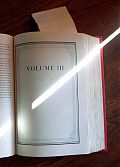
Leo Tolstoy
War and Peace, Volume 3
Volume Three of War and Peace opens in Tolstoy’s first person voice. Not having read that voice yet in this book, then having it intermittent to break lengthy war scenes was like being hand-led by the omnipresent master through his own gropings. Soothing and sometimes tedious, in Volume Three Tolstoy has much to say.
What I have jokingly referred to as Tolstoy’s history lesson comes poignantly true. He’s not as concerned with what events are ascribed to paper, as how they are ascribed to paper. Tolstoy wants us to rethink history’s definition and give it back to the true movers: the people. Russia and France’s war of 1812 was not determined by the will of higher-ups, by Napoleon or Kutuzov, but by the cycling of events, random and unpredictable, by the collective will of the people washed away on patriotic fervor, uniform and disparate motivations and feelings.
And it was not Napoleon who ordained the course of the battle […]. Which meant also that the way these people were killing each other occurred not by the will of Napoleon, but went on independently of him, by the will of the hundreds and thousands of people who took part in the common action.
Tolstoy is asking us to look not at the leaders to find the course of events, but towards those who are pulled into the heart of those events for some reason or another. If French soldiers had refused to be expendable, refused to fight, what has been called Napoleon’s strategic genius would amount to nought. From outside, we tend to picture soldiers as pawns moved this way and that by governing hands, a sentiment that can extend to most anything political and social: BP is the bastard (or Obama or…), we can say, and fail to look at our individual gas-guzzling ways.
Tolstoy’s view of history is more hopeful than helpless. At the same time it is extremely discouraging. In the Battle of Borodino man went up against man with canons, muskets, bayonets and shells of killing power; hundreds of thousands were killed or wounded and left for dead. What is that infinitesimal element that governs the masses? We are still far far away from brotherly love, my friend.
Rich, fat Pierre enters Borodino’s battlefield out of sheer curiosity. At first he is absolutely blind to the horrors surrounding him; he is joyful to see the billowing clouds of musket smoke so early on the still and beautiful late summer morning. He listens for awhile to Kutuzov then wanders on. Into the heart of battle but doesn’t know it: the Raevsky redoubt. The soldiers he befriends there, die there, forever implanting a category of people into his mind whom he calls they.
And they are simple. They don’t talk, they do. A word spoken is silver, unspoken is gold. Man cannot possess anything as long as he fears death. But to him who does not fear it, everything belongs. If there was no suffering, man would not know his limits, would not know himself.
Prince Andrei, instead of being a big-shot’s adjutant, chooses to fight where he is placed. No longer can he find satisfaction in relaying pointless orders to those who use war to acquire one more little cross or ribbon.
War isn’t courtesy, it’s the vilest thing in the world, and we must understand that and not play at war.
Prince Andrei is able to say this as one who is about to face death with clear cold eyes. “Leave it to those on the top to make their muddle,” he says, “tomorrow we’ll win the battle.”
So a spiritual break-through of each character comes about in a similar way, bolstering Tolstoy’s more direct observations. Napoleon is spiritually shabby and greedily vainglorious in comparison to these two characters (and in comparison to most Russians, Tolstoy would have us believe). The battlefield belongs to the men of action not to the men of talk. The choice is simple: speak or do?
· · · · · · · · · · · · · · · · · · · ·